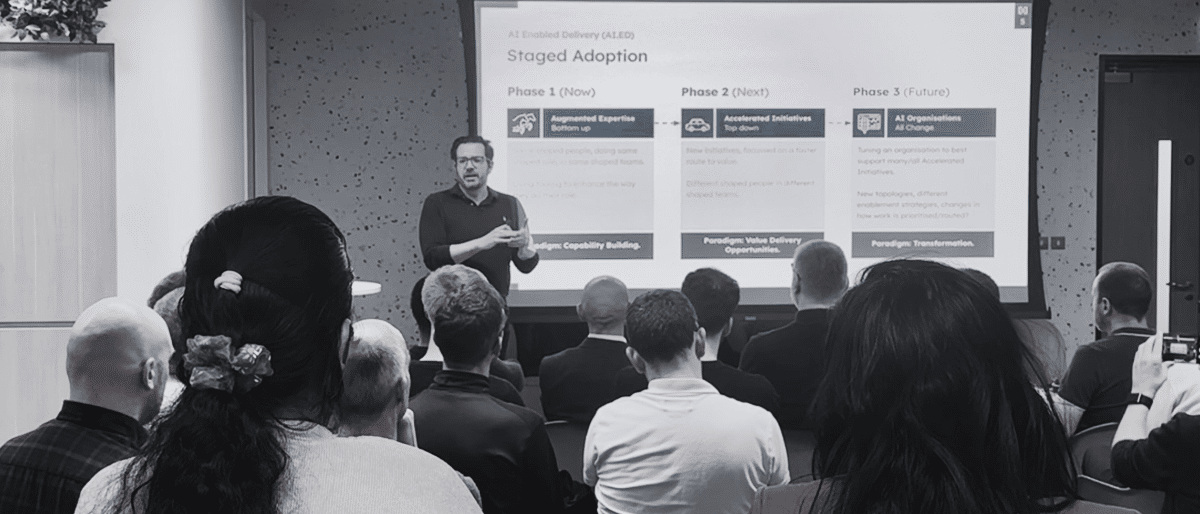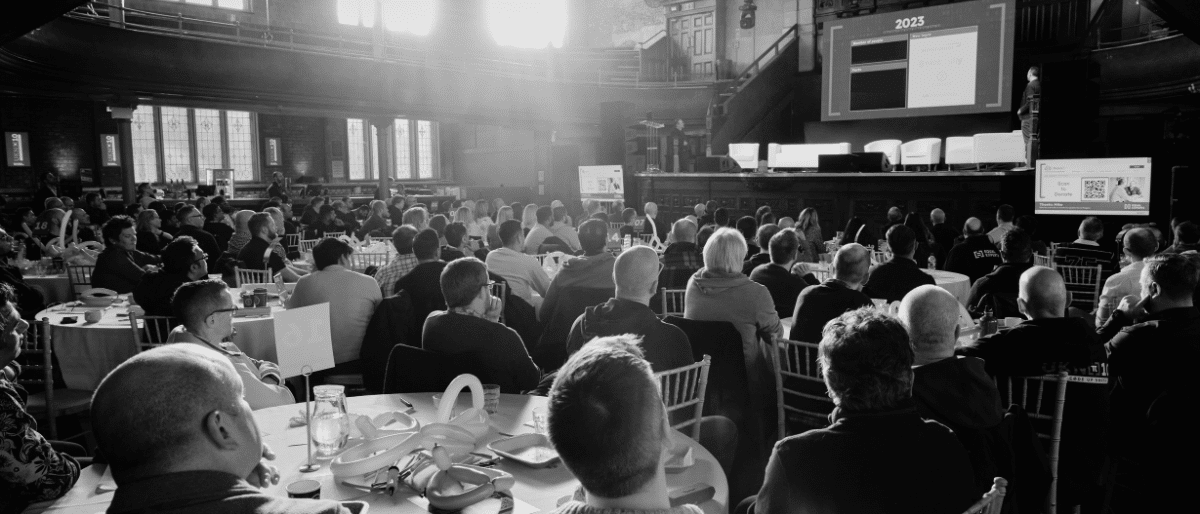Just over a month ago, we celebrated the 10th anniversary of Equal Experts UK North. What started as a new Manchester hub for the Equal Experts model has expanded to become an innovation network running through Leeds, Sheffield and Newcastle. UK North today is a network of technologists sharing ideas, amplifying one another’s impact, and helping to drive digital transformation for some of the world’s largest organisations. It shows how vibrant, original, important, and international the thinking of this region has become.
Those characteristics were all on show when our Equal Experts North community packed into the offices of Disney’s engineering team in Manchester for our first in-person Expert Talks event in Manchester since the pandemic. It was a big occasion, with a very big subject at the centre.
Bringing straight-up strategic thinking to AI Enabled Delivery
Our Expert Talk focused on AI Enabled Delivery, a subject that’s dominating conversations for senior technologists daily. We brought together three Equal Experts speakers to help inform how teams can think strategically about AI Enabled Delivery: the objectives to set, the benefits to seek, the risks to be aware of, and the plans and processes that can bring it all together. They brought perspectives that are informed by real experiences on the frontline of applying AI to the software development lifecycle. It’s exactly the type of thinking that’s required if we’re to unlock one of the most valuable, and least understood, applications of the technology.
For those of you who couldn’t make it to Manchester, and those of you who would just like a quick reminder, here’s a quick summary of the key ideas from our three experts.
Stop building the thing… starting now
Equal Experts Head of AI Delivery, Phil Parker, had spent the previous few weeks leading up to the Expert Talks on a whirlwind tour of events, roundtables and dinners spending time with CTOs and other leaders who are grappling the challenge of deploying AI Enabled Delivery, and he opened the talk with insights into where the software development community is at, right now, capturing his findings in his recent blog here:
“My CEO keeps coming and asking me how we are using AI in the SDLC!” – AI Enabled Delivery According to 50+ Tech Leaders
The ambition and the challenge are best summed up by one of Phil’s favourite quotes: “Stop building the thing, and build the thing that builds all the things.” That’s the promise of AI Enabled Delivery, but realising that promise has to involve a fundamental shift in thinking on the part of organisations as a whole, and not just about coding. AI Enabled Delivery gets a lot less attention publicly, and within businesses, than AI-infused products and services. However, its impact will be far more profound.
Phil’s conversations have led him to two pieces of advice for senior technologists. The first is not to panic, because at this stage everyone may be talking about AI in the SDLC – but most of those conversations are about the lack of progress they’re making or the barriers they’re coming up against. Nobody has been left behind – yet.
The second piece of advice is not to do nothing. Even though progress on AI Delivery has been slow so far, it won’t stay that way. Organisations may think they’ve reached the limits of what AI can bring to software development, but in reality they’ve just reached the limits of how they work with the technology. Once teams start to organise themselves around AI in meaningful ways, the pace of change will leap forward.
Anticipate how developer roles are changing – and get ready to support them
It was really exciting to hear Principal Product Engineer AI, Patrick Debois, explore some of the shifts that this will involve. Patrick is one of the original pioneers of DevOps and a renowned expert on how DevOps and DevSecOps intersect with AI. Exciting too, because of his infectious appetite for curiosity and experimentation – and an absolute refusal to just follow the hype cycle.
Patrick explained that we’re trying to plan for a future of AI Enabled Delivery that is still taking shape. However, some clear outlines of that shape are starting to emerge, and they point to a need to think beyond AI changing how we code. Developers’ roles are changing, and we need to design tools, structures and processes that support those new roles.
Patrick’s talk focused on the 4 Patterns of Native Development.
- As we move from code producers to code managers, we’ll need to adapt to the increased cognitive load involved in reviewing AI code at scale, with a growing awareness that blind automation without testing isn’t going to work.
- As we move from implementation to intent, we’ll need to develop tools that work with agentic AI to capture our intent more effectively.
- The greater emphasis on ideation and prototypes that AI makes possible demands a shift from delivery to discovery.
- When it comes to maintaining code bases and documentation, we can leverage AI to move from amassing content to generating actionable knowledge.
The end result? Scaled-up software delivery through AI will still require humans in the loop, but they’ll be looped-in in very different ways and for very different purposes. Patrick offered a compelling glimpse of how developers can start to apply their skills to experimenting in a constructive way with tools that support those roles.
Want to augment expertise? Don’t just take a tool off the shelf
We rounded out the evening with a hands-on demonstration from Lead Consultant and QA Engineer, Adrian Rapan. Adrian took us through the process of using agentic AI to build an automation framework, one of the long and expensive processes which AI Enabled Delivery can significantly shorten.
Adrian demonstrated how the framework that he built is able to cut the development of user journeys from weeks to hours. However, he also demonstrated how these gains depend on imaginative thinking about exactly how to augment developer expertise, and how to maintain human oversight. He discussed the need to encode his own domain knowledge into the AI context window and shift focus from writing out code to specifying requirements in the right way. It was a fascinating, live example of how effective AI Enabled Delivery will involve so much more than just picking tools off the shelf.
Throughout the life of Equal Experts North, we’ve prided ourselves on thinking beyond the latest technology and tools to build the strategies and processes that those tools require. That often requires thinking slightly against the flow, sticking up for a strategic perspective and supplying a deeper and more practical point of view that’s essential for executing on the vision organisations have. That thinking has more value today than ever. It was great to see so much of it on display at Expert Talks Manchester.




